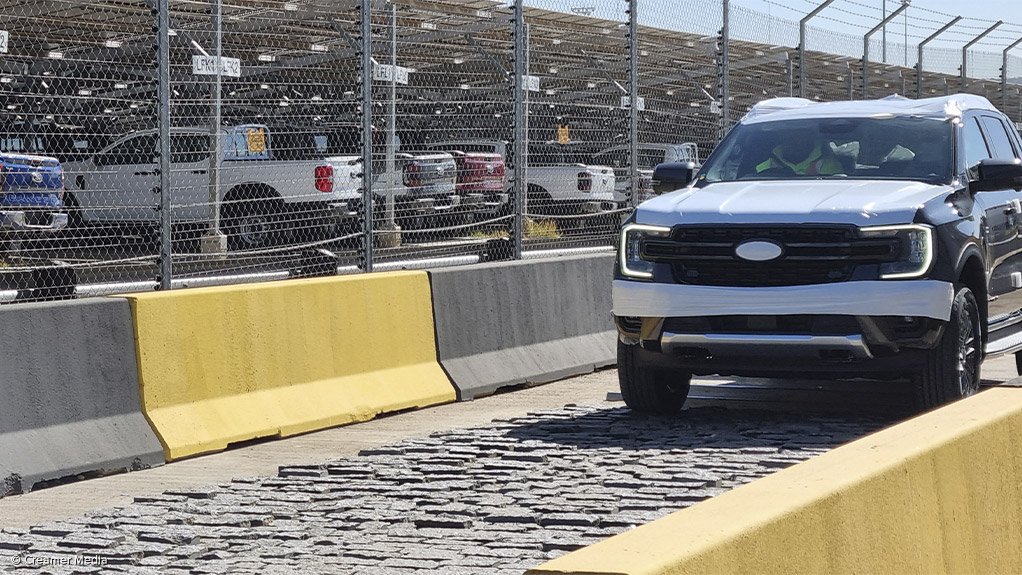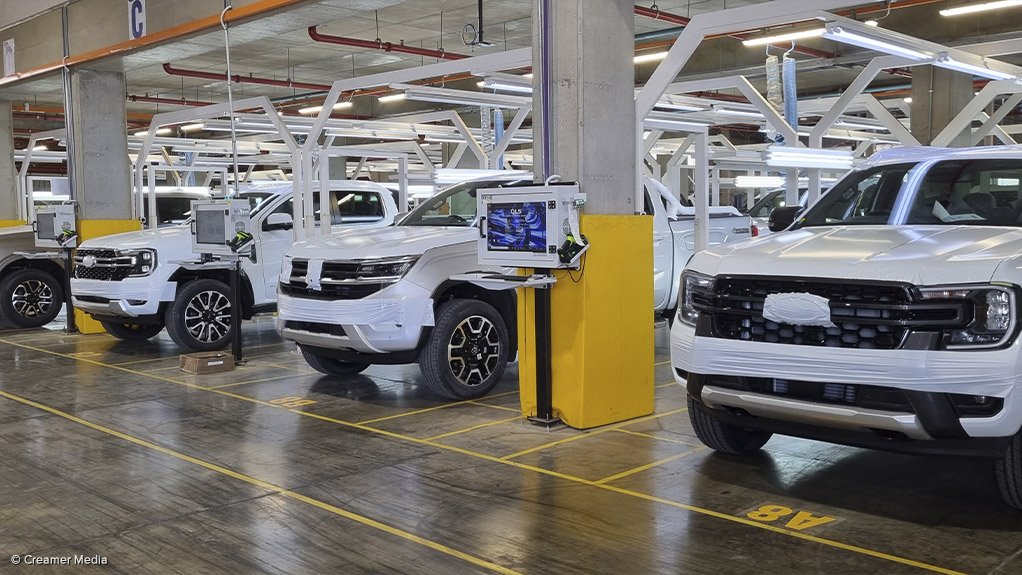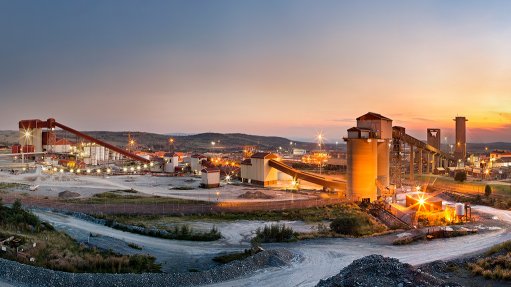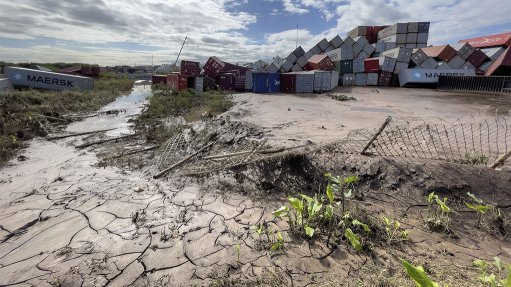Ford unveils new investments at Silverton plant
Vehicle manufacturer Ford Motor Company of Southern Africa (FMCSA) has showcased new investments, beyond the R15.8-billion initially committed, at its Silverton facility, in Pretoria.
The new investments are aimed at improving efficiency, customer satisfaction and the rate of repairs per 1 000 vehicles.
Some of the new investments include R22-million into a skid cleaning facility within the paint shop, which encompasses a high-pressure water system to blast paint off the facility’s 760 skids at 2 500 bars of pressure.
The skids are used to mount vehicle body parts for spray painting and movement throughout the assembly process.
The skids, which accumulate up to 8 kg of paint a year, used to be cleaned on a yearly basis, at a cost of between R1-million and R2-million; however, the high capital cost of the skid cleaning facility ensures that each skid is cleaned on a monthly basis, which reduces dirt and contaminants entering the paint shop.
The more regular removal of built-up paint residue from the skids also ensures consistent docking of body and load boxes, as well as optimal paint application and improved quality overall.
FMCSA explains that a 20-minute blasting cycle typically uses 400 litres of water, which equates to between 17 litres and 19 litres a minute. The company opted to rather use a lower amount of water at a high pressure, than a higher amount of water at a low pressure, to clean the skids.
Another investment involved R20-million into a DeGould Auto Scan system, which is an artificial intelligence scanning system used for vehicle inspection. The system takes high-definition, full-body images of every vehicle prior to being released from the Silverton plant.
It detects misbuilds, damage or defects that are smaller than can consistently be found by the human eye, and at a quicker pace of between 30 to 50 seconds per vehicle.
The Ford group uses two other automated vehicle inspection systems in the US, making Silverton the only other plant of the group outside of the US to incorporate the technology.
The information gathered by the DeGould system serves as an excellent source of data for claims disputes, which, Silverton plant manager Tim Day explains, ensures the plant investigates warranty claims quicker and incurs lower costs related to repairs – which are sometimes the fault of logistics companies or dealerships.
The integrated DeGould solution incorporates a dashboard that can be viewed on a computer or smartphone.
Combined with barcode scanners, the system is fully integrated into Ford’s global quality management systems, and is trainable to detect and identify any new types of quality issues that may emerge.
Moreover, FMCSA invested R15-million into a new scrapyard, which increases the amount of scrap that is sorted and recycled on site. The new facility also comprises undercover areas to protect paper waste from rain and enable the bailing of waste paper for recycling.
The stamping press process in the facility alone generates about 20 t of scrap material a month. The stamping plant comprises five tandem presses, including a 2 500 t draw press, a 1 600 t press and three 1 000 t presses that stamp the flat sheet metal into the various inner and outer body panels required for all the body styles of the Ranger.
The investments form part of FMCSA’s heightened focus on addressing field issues and taking a proactive approach to recalls to cut warranty spikes. For example, warranty spikes typically occur with the launch of a new vehicle model and take upwards of 18 months to normalise.
Through new plant investments and a focus on quality, the Silverton plant recorded a warranty spike recovery within six months from the launch of the new Ranger in December 2022.
Day explains that the primary drivers of the Ranger spike were attributed to latent concerns which could not be detected within the standard quality plant inspection.
The company then employed a rapid response team approach to ensure fewer repair claims, as well as to change the way it works upstream in the development and testing process, quality director Kevin Heunis notes.
He adds that Ford’s Rapid Hubs have ensured better customer engagement.
In May 2019, Ford recorded 34.7 repairs per 1 000 Rangers, with an improvement to 4.8 repairs per 1 000 Rangers recorded in June 2021. This improves on a rate of repairs of 400 vehicles per 1 000 Rangers between 2008 and 2010.
During a media tour of the new facilities at the Silverton plant on June 20, FMCSA confirmed that the Silverton plant is performing above Ford’s global average of repairs per 1 000 vehicles.
FMCSA has also been improving facilities for its workforce, including by building a central indoor and outdoor canteen and a laundry facility to wash personal protective clothing on a daily basis.
The Silverton assembly plant is capable of producing 720 vehicles a day, or 200 000 vehicles a year, based on three shifts a day. Day says the plant was producing vehicles at a rate of 704 a day, owing to the semiconductor shortage globally holding volumes back.
More than 22 200 next-generation Rangers have been exported, while 7 412 units have been sold in South Africa as at the end of May. The Silverton plant produced just under 30 000 next-generation Rangers at the end of May.
The next-generation Ranger was announced early in June as the South Africa Car of the Year for 2023, becoming the first bakkie, or pickup, to earn the coveted title since the competition began in 1986.
Comments
Announcements
What's On
Subscribe to improve your user experience...
Option 1 (equivalent of R125 a month):
Receive a weekly copy of Creamer Media's Engineering News & Mining Weekly magazine
(print copy for those in South Africa and e-magazine for those outside of South Africa)
Receive daily email newsletters
Access to full search results
Access archive of magazine back copies
Access to Projects in Progress
Access to ONE Research Report of your choice in PDF format
Option 2 (equivalent of R375 a month):
All benefits from Option 1
PLUS
Access to Creamer Media's Research Channel Africa for ALL Research Reports, in PDF format, on various industrial and mining sectors
including Electricity; Water; Energy Transition; Hydrogen; Roads, Rail and Ports; Coal; Gold; Platinum; Battery Metals; etc.
Already a subscriber?
Forgotten your password?
Receive weekly copy of Creamer Media's Engineering News & Mining Weekly magazine (print copy for those in South Africa and e-magazine for those outside of South Africa)
➕
Recieve daily email newsletters
➕
Access to full search results
➕
Access archive of magazine back copies
➕
Access to Projects in Progress
➕
Access to ONE Research Report of your choice in PDF format
RESEARCH CHANNEL AFRICA
R4500 (equivalent of R375 a month)
SUBSCRIBEAll benefits from Option 1
➕
Access to Creamer Media's Research Channel Africa for ALL Research Reports on various industrial and mining sectors, in PDF format, including on:
Electricity
➕
Water
➕
Energy Transition
➕
Hydrogen
➕
Roads, Rail and Ports
➕
Coal
➕
Gold
➕
Platinum
➕
Battery Metals
➕
etc.
Receive all benefits from Option 1 or Option 2 delivered to numerous people at your company
➕
Multiple User names and Passwords for simultaneous log-ins
➕
Intranet integration access to all in your organisation























